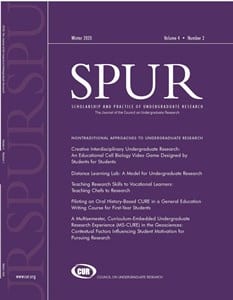SPUR (2020) 4 (2): https://doi.org/10.18833/spur/4/2/7
In a three-year, practice-based, creative research project, the team designed a video game for undergraduate biology students that aimed to find the right balance between educational content and entertainment. The project involved 7 faculty members and 14 undergraduate students from biological science, design, computer science, and music. This nontraditional approach to research was attractive to students. Working on an interdisciplinary practice-based research project required strategies related to timeline, recruitment, funding, team management, and mentoring. Although this project was time-consuming and full of challenges, it created meaningful learning experiences not only for students but also for faculty members.
More Articles in this Issue
- Vignette‐ Heide S. Temples, Mary Ellen Wright, Olivia Chafe, Haley McKee, and Emily Guthrie
SPUR (2020) 4 (2): https://doi.org/10.18833/spur/4/2/9 - Vignette‐ Mark Lubkowitz, Cierra Pierce, and Tabitha Finch
SPUR (2020) 4 (2): https://doi.org/10.18833/spur/4/2/4 - Vignette‐ Jonathan Briganti and Anne M. Brown
SPUR (2020) 4 (2): https://doi.org/10.18833/spur/4/2/3 - Vignette‐ Lorraine S. Wallace, Mikafui Dzotsi, and Kayla Daniel
SPUR (2020) 4 (2): https://doi.org/10.18833/spur/4/2/11 - Practice‐ Crissa Levin and Jennifer Grewe
SPUR (2020) 4 (2): https://doi.org/10.18833/spur/4/2/12 Abstract:Degree-seeking distance students, who often are from disadvantaged demographics, are becoming increasingly common. Degrees earned through distance learning can be viewed as less acceptable by graduate schools and employers, yet undergraduate research can aid in employment and graduate or professional school applications. Therefore, it is important to offer distance research labs to distance-learning students. This article discusses a framework for social science distance labs based on a successful undergraduate distance lab. The framework is built on three principles: (1) identifying values, which can be used to guide decisions on lab direction; (2) overcoming obstacles based on identified values; and (3) playing to the online medium by gearing the lab toward research that can be conducted virtually
- Assessment‐ Joseph L. Allen, Stephen C. Kuehn, Elizabeth G. Creamer, and Janice E. Austin
SPUR (2020) 4 (2): https://doi.org/10.18833/spur/4/2/8 Abstract:This study undertakes an unusual approach to the course-based undergraduate research experience (CURE) by engaging students in an ongoing research project that is embedded across two years of required coursework, including four geology courses and a capstone summer field experience. The authors describe the curriculum, note the importance of scaffolding and feedback, and assess outcomes in a rural population of students from an economically depressed area relative to a non-CURE comparison group using a mixed-methods approach. The results show the multi-semester CURE students preferred fieldwork, routine data collection, and other hands-on skills consistent with a broad interest in college as workforce preparation. The authors highlight the importance of contextual factors as a motivation for pursuing research, including the nature of the academic discipline and student demographics.
- Article‐ Jacqueline S. McLaughlin, Mit Patel, and Joshua B. Slee
SPUR (2020) 4 (2): https://doi.org/10.18833/spur/4/2/15 Abstract:A course-based undergraduate research experience (CURE) using cell culture–based research was developed to allow students to test potential molecules for their ability to prevent the host inflammatory response to implantable biomaterials. This CURE was utilized for lab instruction in cell biology courses over a three-year period at two institutions and was assessed using a modified student assessment of learning gains (SALG) survey and a rubric from the Association of American Colleges and Universities (AAC&U). The SALG survey analysis showed enhanced essential “hard” skill sets and attitudes important to a future research career using cell culture post–CURE participation. The results from both SALG and AAC&U assessments revealed gains in four of the six most highly valued “soft” skills rated by US employers as essential in their hiring of recent college graduates.


